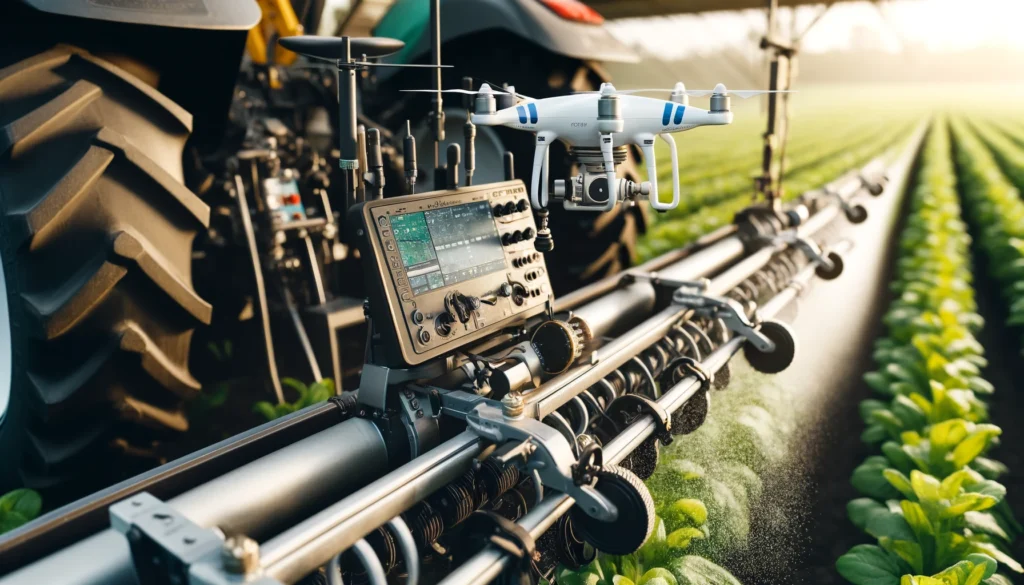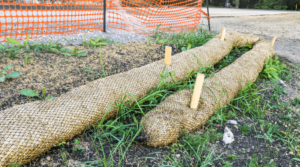
Agriculture Dictionary A close up shot of various precision farming equipment on a modern farm. The focus is on a GPS guided tractor a drone with sensors and a2.webp.webp
Definition: Precision Farming Equipment
Precision farming equipment refers to advanced agricultural tools and machinery designed to optimize field-level management regarding crop farming. These tools use technologies like GPS, sensors, and data analytics to enhance the efficiency, productivity, and sustainability of farming practices. Precision farming equipment includes GPS-guided tractors, variable rate technology (VRT) seeders, automated sprayers, soil moisture sensors, and drones for crop monitoring. The primary goal of precision farming is to apply the right amount of inputs (water, fertilizer, pesticides) at the right time and place to maximize crop yields and minimize waste.
Precision Farming Equipment: An In-Depth Guide
Introduction
Precision farming equipment is transforming modern agriculture by providing farmers with the tools and technology needed to manage their fields with unprecedented accuracy and efficiency. This guide explores the various types of precision farming equipment, their benefits, and best practices for implementation and use. Understanding these technologies can help farmers make informed decisions and optimize their farming practices.
Fall off the barn roof and busted your keister? Life on the farm or ranch can be tough on the bum. Need a break? Laugh it off at FarmerCowboy.com, the #1 farm humor site. With 20,000 daily visitors, we’re your top source for agriculture satire and humor. Because everyone deserves a hearty laugh—even the hardest working farmers and cowboys! Join us and turn those long days into fun tales at FarmerCowboy.com.
Types of Precision Farming Equipment
Precision farming equipment can be categorized based on their applications in different farming activities:
1. GPS-Guided Tractors
GPS-guided tractors are equipped with global positioning systems that enable precise navigation and field operations. They help in tasks such as planting, fertilizing, and harvesting with high accuracy, reducing overlap and waste.
2. Variable Rate Technology (VRT) Equipment
VRT equipment adjusts the application rates of inputs like seeds, fertilizers, and pesticides based on real-time data. This ensures that each part of the field receives the exact amount of inputs needed, enhancing efficiency and crop yields.
3. Automated Sprayers
Automated sprayers use GPS and sensors to target specific areas of the field with pesticides or fertilizers, reducing waste and environmental impact. These sprayers can adjust application rates based on crop needs and field conditions.
4. Soil Moisture Sensors
Soil moisture sensors measure the water content in the soil, helping farmers optimize irrigation schedules. These sensors provide real-time data that can be used to ensure crops receive the right amount of water, improving water use efficiency.
5. Drones for Crop Monitoring
Drones equipped with cameras and sensors capture high-resolution images and data from the fields. They are used for monitoring crop health, assessing damage, and creating detailed maps for precision farming applications.
6. Precision Planters and Seeders
Precision planters and seeders ensure accurate seed placement and spacing, leading to uniform crop stands and better yields. They can be equipped with sensors to monitor seed placement and soil conditions in real-time.
Benefits of Precision Farming Equipment
Implementing precision farming equipment offers numerous benefits:
- Increased Productivity: Precision equipment improves the efficiency of farming operations, leading to higher crop yields and better resource management.
- Cost Savings: By optimizing input use, precision farming reduces waste and lowers input costs, resulting in significant cost savings.
- Enhanced Sustainability: Precision farming equipment promotes sustainable practices by minimizing environmental impact and conserving resources such as water and fertilizers.
- Improved Decision-Making: Real-time data and analytics from precision farming tools help farmers make informed decisions and improve overall farm management.
- Labor Efficiency: Automated machinery and precision tools reduce the need for manual labor, allowing farmers to focus on strategic planning and management.
Challenges in Implementing Precision Farming Equipment
Despite its benefits, implementing precision farming equipment can present several challenges:
- High Initial Costs: Investing in advanced precision equipment requires significant capital, which can be a barrier for small and medium-sized farms.
- Technical Complexity: Operating and maintaining precision equipment requires specialized knowledge and training.
- Data Management: Managing and interpreting the large amounts of data generated by precision farming tools can be challenging.
- Integration Issues: Integrating new precision equipment with existing systems and practices can be complex and time-consuming.
- Dependence on Infrastructure: Reliable internet connectivity and power supply are essential for the effective use of many precision farming technologies.
Best Practices for Implementing Precision Farming Equipment
To maximize the benefits of precision farming equipment, consider the following best practices:
1. Conduct a Needs Assessment
Evaluate your farm’s specific needs and challenges to identify the most suitable precision technologies. Consider factors such as crop type, field size, and resource availability.
2. Invest in Training
Ensure that all operators and farm workers receive proper training on using precision equipment. This includes understanding how to operate machinery, interpret data, and perform routine maintenance.
3. Start Small
Begin with pilot projects to test new precision equipment on a small scale before full-scale implementation. This allows you to identify potential issues and make necessary adjustments.
4. Prioritize Data Management
Develop a robust data management strategy to ensure data collected from various sources is accurate, secure, and accessible. This includes investing in reliable data storage and analytics platforms.
5. Collaborate with Experts
Work with technology providers, agricultural consultants, and research institutions to stay updated on the latest advancements and best practices in precision farming.
Case Study: Successful Implementation of Precision Farming Equipment
The Thompson Family Farm
The Thompson family operates a 1,500-acre corn and soybean farm. They successfully integrated various precision farming technologies into their operations, leading to significant improvements in productivity and sustainability. Key elements of their success included:
- GPS-Guided Tractors: The Thompsons invested in GPS-guided tractors, which enhanced planting accuracy and reduced overlap, saving time and resources.
- Variable Rate Technology: They implemented VRT equipment for fertilizing and seeding, optimizing input use based on soil and crop conditions.
- Soil Moisture Sensors: Soil moisture sensors helped the family optimize irrigation schedules, improving water use efficiency and crop health.
- Drones for Crop Monitoring: Drones provided valuable data on crop health and field conditions, allowing for timely interventions and better management.
Results
The Thompson family’s investment in precision farming equipment led to increased crop yields, improved resource efficiency, and enhanced sustainability. The use of precision tools and real-time data contributed to cost savings and better overall farm management.
Conclusion
Precision farming equipment is essential for the efficiency and productivity of modern agricultural operations. By investing in advanced machinery, software, and data analytics tools, farmers can enhance their operations and support sustainable farming practices. Understanding the different types of precision farming equipment and best practices for their implementation and use is crucial for maximizing the benefits and ensuring the long-term success of a farm.
How Knowledge of Precision Farming Equipment Can Help Farmers
Understanding precision farming equipment helps farmers make informed decisions about technology investments, maintenance, and upgrades. Knowledge of different types of precision equipment and their applications enables farmers to optimize resource use, enhance productivity, and ensure the safety and welfare of their workers and livestock. This understanding also supports sustainable farming practices and long-term agricultural success.
Resources for Further Reading
To further explore precision farming equipment and related agricultural topics, visit the following resources:

Originally posted 1999-05-24 08:51:56.
Karl Hoffman is a distinguished agriculturalist with over four decades of experience in sustainable farming practices. He holds a Ph.D. in Agronomy from Cornell University and has made significant contributions as a professor at Iowa State University. Hoffman’s groundbreaking research on integrated pest management and soil health has revolutionized modern agriculture. As a respected farm journalist, his column “Field Notes with Karl Hoffman” and his blog “The Modern Farmer” provide insightful, practical advice to a global audience. Hoffman’s work with the USDA and the United Nations FAO has enhanced food security worldwide. His awards include the USDA’s Distinguished Service Award and the World Food Prize, reflecting his profound impact on agriculture and sustainability.






